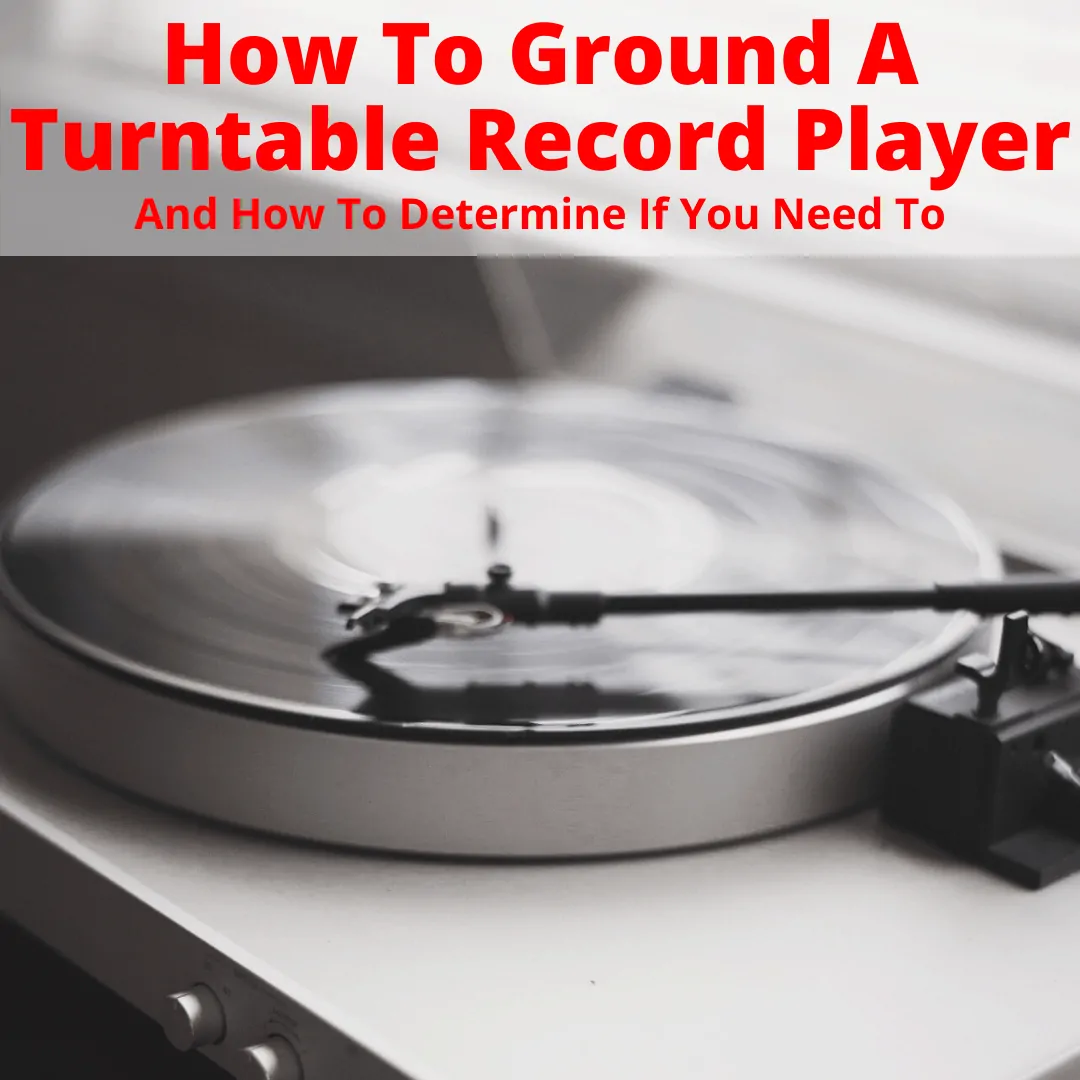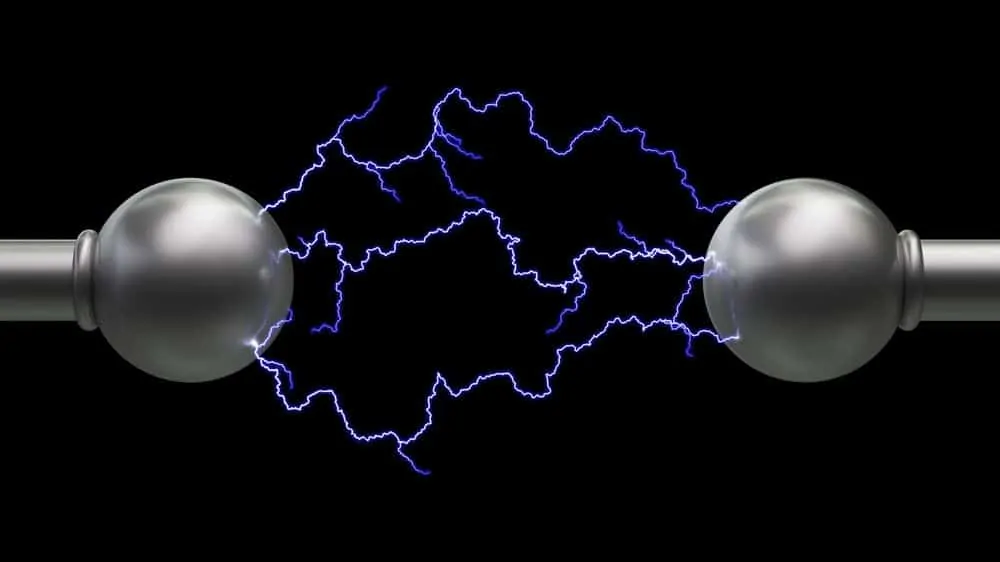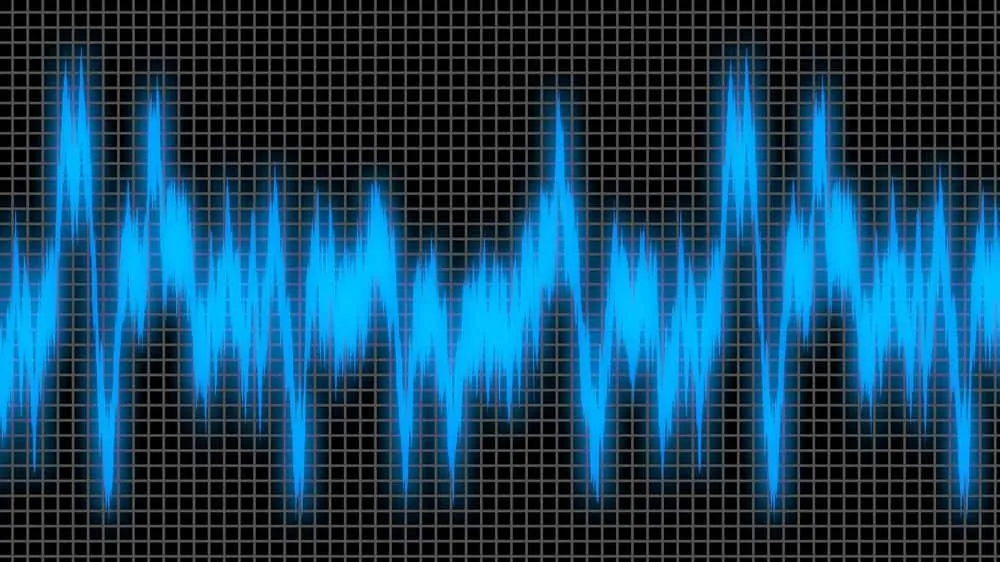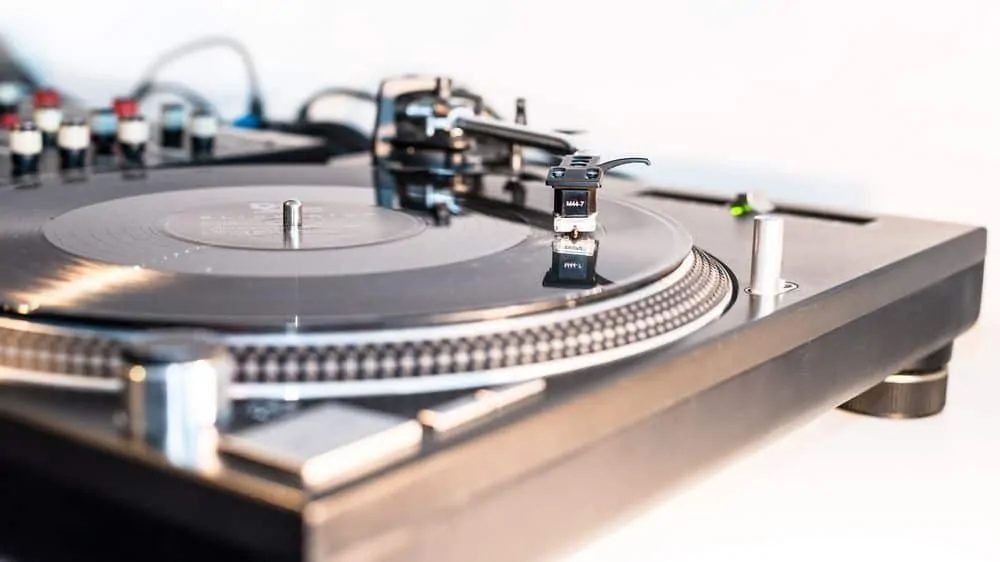
But it’s an easy thing to do, so why not do it?
Even if you don’t need to do it now, eventually, you’ll be glad you did.
At some point, your record player could begin to emit a humming sound. This is often due to what is called a “ground loop.”
The way to fix a ground loop is to ground your turntable.
Even if you do not currently have this problem, it is not uncommon for it to crop up at some point.
So let’s take a few minutes of our time and prepare for it now, so that you never have to deal with “ground loop” in the future.
We’ll begin by taking a closer look at why exactly you want to ground your turntable record player.
Contents
Why Ground A Turntable?
The short answer is: to enjoy a hum-free music experience from your record player. That hum can be annoying.
But whether you’ve had your turntable for a while, or are just coming to grips with it, the humming is something you can easily avoid.
Your turntable needs electricity and is covered by metal. And anything made of metal that carries electricity runs the risk of live wires coming into contact with the highly-conductive metal casing.
This causes a ground loop. On heftier devices, this could cause a shock when you touch it. But for turntables, the result of a ground loop is an annoying hum. It happens to an even more intense degree if your turntable is handling signals from a sensitive cassette.
Luckily, ground loops are not hard to avoid.
Do You Have To Ground Your Turntable?
The best way to answer this is to ask another question: do you want the records you play on your turntable to be pure and crisp, uninterrupted by a horrible hum that grows into an irritating crescendo when you turn the volume up? If you answered “yes”, then you need to ground your turntable.
The type of turntable doesn’t matter. Whether you have a belt or a direct drive turntable, you might encounter ground loop at some point. The only thing that makes a difference in whether you actually have to ground your turntable, is if you have an amplifier with a built in phono preamp.
A ground loop is the result of a lack of grounding. More scientifically, it’s the result of the chassis connections not having the same ground potential or voltage.
To avoid that hum emanating from your turntable, you need to ground it correctly to your amplifier. Not only will this minimize, or even get rid of, the hum, but it will help your turntable reach its full potential, giving you the best quality sound it can possibly produce.
But before you ground your turntable, you should probably figure out whether or not the hum actually is caused by a ground loop.
A ground loop hum is one of two hums you might hear. The ground loop hum is 120 hertz, while the other is 60 hertz. You’ll have to rule out the 60 hertz hum to know whether it is time to get your hands mildly dirty and ground your turntable.
You’re probably thinking this sounds far too scientific and only expert can distinguish between the two hums. That is not the case. Any untrained ear can clearly hear the difference
Think of the 60 hertz hum as an elephant rolling around the savanna, low and slow, and think of the 120 hertz as an angry wasp. The 120 hertz hum is far higher in pitch and more aggressive than the 60 hertz hum, which is low and placid. If you’re still not sure, this page can help.
If none of that helped, there are three other ways to figure out if you’re battling a 120 hertz or a 60 hertz hum.
If you turn the volume up and down, does the hum follow suit? Does it get louder when the volume goes up, and quieter when the volume drops?
Next select different inputs and take note if others still carry the hum. If they do and the hum did not change volume when you adjusted the volume knob, then your problem is ground looping.
If the volume changes and the hums only appears with one (or some) inputs, then the hum is likely coming from the source(s) of the input(s) in question.
To tell once and for all if the hum is caused by ground loop, disconnect all your inputs. If the humming stops entirely, you’ve got a case of ground loop.
What did you find? Is your hum, caused by ground loop? Then let’s find out how to fix it and listen to your music the way you deserve to.
How To Ground A Record Player (Even Without Ground Wire)
Materials Needed
- Grounding wire attached to the turntable
- About 5 feet (1.5 meters), of fine insulated 18 to 20 gauge stranded wire, if your turntable doesn’t have a grounding wire
- Grounding terminal attached to the amplifier, although there is a workaround if your amplifier does not have a grounding terminal
- Gaffer tape, if your amplifier does not have a grounding terminal
- Needle nose pliers
Step 1: Turn Off The Power
You don’t want to end up with a case of tinnitus (that would never happen regardless, so don’t worry), so turn off the amplifier and the turntable.
This way, there’s no danger of any loud noises popping off from either as you connect what you need to. The risk of shock is already extremely low, but turning the amplifier and turntable off eliminates it entirely.
Step 2: Find The Ground Wire
Usually, it’ll be attached to the underside of the turntable’s metal chassis. You’ll notice the wire by the unconnected copper spade connector, which is generally a flat piece of metal that has a u-shape carved out if it.
There’s no standard color your grounding wire will be, but most are green. If you have a more modern turntable, and are having difficulty finding the grounding wire, check beneath the chassis – it may be wrapped up with a twist tie. If it is, unwrap the wire.
If you can’t find a wire at all, you’ll have to manufacture your own grounding wire. This is where the 5 feet, or 1.5 meters of 18 to 20 gauge stranded wire comes in. Using the needle nose pliers, strip about 6 to 8 mm of the insulation from both ends. More steps to follow.
Step 3: Find The Grounding Terminal
This will be on the back of your amplifier or terminal. If it’s there, you shouldn’t miss it, because it’s clearly marked “Ground”. It’ll look one of two ways – either a metal post with a ridged shaft, or it’ll be a run-of-the-mill screw terminal. Once you’ve found the ground terminal, loosen it.
You might find that there is no grounding terminal. Don’t worry, you can still ground your turntable with just the grounding cable and the actual body of the amplifier.
Step 4: Check the Measurements
Now that you’ve found the grounding wire and its matching terminal, make sure the wire can actually reach the terminal. If it can’t, move your equipment closer together.
Step 5: Make A Connection
Remember way back in step one, when you turned your turntable and amplifier off ? Well, now is when that becomes important.
Take the grounding wire’s copper spade connector, and place it on the grounding terminal. Then tighten the connection, but don’t over-tighten it or you might strip the terminal.
If your amplifier doesn’t have a grounding terminal, use gaffer tape to stick the grounding wire’s copper spade connector to the amplifier’s metal box.
If you’re making your own grounding wire, take one stripped end and attach it to the chassis of the amplifier, preferably to a screw, and not to the speaker terminal. Then take the other end of the wire and attach it to the chassis of the turntable, also to a screw.
This serves the same purpose as the grounding wire being attached to the grounding terminal, but finding the spot that creates the best connection and emits less hum might take a little exploring.
A simple way to test for the best spot is to touch the end of the wire on different areas of the turntable’s chassis (with the power turned back on, and taking care not to touch any of the metal with any part of your body).
Step 6: Enjoy The Result
Once the record player is grounded, turn it back on, and relish a hum-free music experience.
DIY Turntable Ground Wire: Final Thoughts
Unless your record player has an internal preamp, it is a good idea to ground it to the external amplifier. You will get a much clearer sound as a result. Follow the instructions above to ground your turntable correctly. You can also have a record store clerk take care of it for you.



My turntable doesn’t have grounding wire as it has built-in preamplifier. Where do you connect the grounding wire in the turntable….
It will be already ground if it has a preamp
I have an old ’70s Dual. Hum comes and goes regardless of the ground. In addition, there are two wires! One with the described connector at the end and another with bare wire at the end. HELP!
The solution isn’t always straightforward. It can be misery.
The real purpose of this ground wire is, to shunt away static voltage buildup. It can come from your body/clothing or the rotating assembly in the table. Whenever you touch your cartridge or tonearm, touch the metallic turntable or something metal first to begin a discharge. There is an argument for the benefits of metal audio racks here. This lowers your potential closer to that of the device.
Now, the actual hum. The wire with the ring on the end is sometimes placed on the screw that holds the plastic faceplate on an electrical receptacle. The same practice is use with ESD mats when working on electronics. While that is optional, the wire with the bare end or C-shaped clip goes to the screw terminal on a phono amplifier next to its RCA or XLR inputs (the small amplifier that fits in your hand) and should be connected. If the phono amplifier is instead built into a separate line-stage preamplifier or all-in-one type receiver, there will be a a ground terminal on the back panel just the same.
Sometimes, grounded electronics actually cause hum, but if your gear has the usual 2-prong plug (North America) then it is a Class II type power entry device and is not DC grounded. It may, in some cases, be AC grounded with two safety Y-capacitors from the hot and neutral to the chassis, or power supply.
Another cause of hum, is non-shielded cartridge pick up of the motor in a direct-drive table or internal belt-drive table with a motor placed close to the platter’s center spindle. We have a good argument for external belt-drive tables.
A less common but real cause of hum can also be a tarnished pin connector on the cartridge. A dab of contact cleaner and reconnecting the cartridge a few times can solve this, It’s good to use a multimeter to check the tonearm wires. Normal automotive silicone brake grease can prevent oxidization on metal contacts. I used it in headphone jacks after cleaning them and it solved the scratchiness when rotating the plug in the jack.
Don’t dismiss the quality of shielding on the cables. The phono amplifier has 40-80dB of gain, and can easily pick up hum from anything in the vicinity if non-shielded cables are used between components, or if there is resistance on the return ground path. Lock your tonearm into the holder, turn up the volume, and run your hand a few mm above the cables, then cartridge, and finally tonearm. Hear a hum? That means the wires at that point have poor shielding.
Good shielded interconnect cables are $20-120. I don’t endorse cables, but WBC sells sensible shielded interconnects with locking Eminence plugs – the outside body of the plug is rotated to lock the ground and shield connection tightly to the RCA jacks.
Lastly, some phono amplifiers just aren’t good at rejecting hum.
“If the volume changes and the hums only appears with one (or some) inputs, then the hum is likely coming from the source(s) of the input(s) in question.”
This is me. What do I do?
Not helpful at all. Spent the article talking about wire. I need to know where to connect a wire from enclosed case of turntable to the reciever
Wayne if you have a ground wire coming out of your “enclosed case of turntable” then all you need to do is connect the other end to the back of the receiver where it says, “Ground” or some abbreviation of ground. If there isn’t anything like that on the back of the receiver then connect it to some metal part of the receiver,, a screw can be backed out a little and the wire wrapped around it would be the best bet.
Someone is missing the point here forget the receiver where do you connect the ground wire to a turntable that didn’t come with one. My Stanton turntable doesn’t have a grounding wire and it hums specially at high volume all old receivers have a grounding wire terminal even my newer Onkyo does the problem is on the new USB turntables like mine supposedly you don’t need it but mine still hums.
I have grounded my turntable to my preamp but I still have a very annoying hum. It goes up as `I turn up the gain on my preamp but then goes away if I turn the gain all the way up. The hum is consistent no matter how `I adjust the cables and preamp and I’ve tried setting it up in different areas of the house to make sure there is no. interference. Any advice?
I have a pair of Gemini 500 II turntables and only one produces a hum after its been on for about 20 minutes even though they are both grounded to my mixer. Will internally grounding the turntables solve this problem? How do I go about doing this myself?
Do I have to ground the turntable to the amp or preamp it is playing through? My turntable is situated quite a ways away from my preamp. Could I ground the turntable to something closer in proximity?
Did you ever find an answer? I have the same situation, My preamp is in a rack in a closet ~ 12 feet away from TT.
It needs to be grounded to the circuit, unfortunately. If, for an extreme example, you just stuck the ground wire to a ground in a wall outlet, you could end up with even worse sound as there could be a significant voltage difference (positive or negative) between the circuit ground and everything that is also connected to the outlet breaker. Probably won’t damage anything though, so might be worth a try for the fun of it
Is there not potential for the noise to be from the long cable between amp and tt? Any power cables near that long cable are a source for interference. Also, are you not getting a voltage drop on that cable?
Does anyone know where I can find a ground wire for a Technics PL-516?
pl-516 is pioneer isnt it?
Just use a shielded piece of 16-20 guage copper wire and add a Y clip at each end and attach beneath a screw or grounds on the turntable (motor mount or metal) and Amp.
Or skip the Y clips and wrap around a Screw on the turntable and amp and tighten.
Either should work fine as long as the wire is shielded.
I have a Beogram 4002 turntable in very good condition. Unfortunately do not have the Amp so have purchased a Technics vintage amp (1979) using a 5 pin din to RCA cable. There was some distortion/humming present so after noticing grounding point on Amp decided to get new quality cable with grounding wire. I had power on (which was a mistake) and as I proceeded to connect GND spade to GND point a spark occurred. Now turntable has no life. What damage likely caused with this? Repairs are obviously necessary, hopefully not too serious. Any advice appreciated
Sounds like you cooked the motor
Good info here. But in need some extra advice.
I don’t have anything to ground my TT which has a preamp. It came with the grounding wire. I have it hooked up to a Sonos connect amd there is nothing to attach the wire to–it’s all ethernet, optical, or RCA jacks. Any advice? What if I gently put a screw into the case, would that be sufficient to ground? I don’t care if it cracks the case.
My turntable does have a built in pre amp with a phono/line switch.
I have 2.1 speakers attached with RCA cables.
My understanding is I do not need to ground my turntable but it came with a grounding wire packaged with the RCA cables.
If I wanted to ground my TT anyway, where could I attach the other end of the grounding wire (coming from the TT)?
There is no ground connection on my speakers or sub woofer. I have no hum that I can tell, just a curiosity question. Thanks!
I have a turntable setup with a separate phono preamp. every thing was fine when all of a strong hum started
which entirely blocked the music. The ground wire screw was loose and tightening it solved the problem.
Now, a few days later the problem has returned. The hum varies with volume and it is only on the main amp
input that’s connected to the phono preamp.
Any ideas?